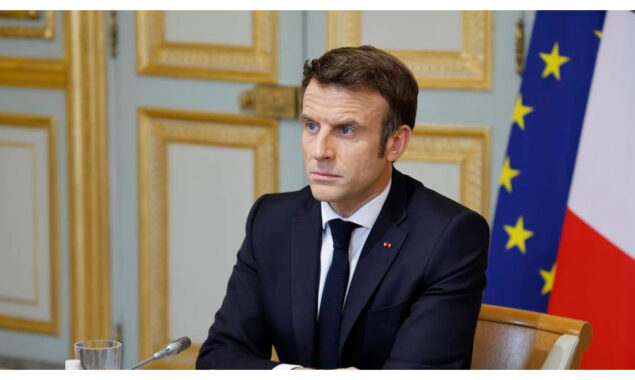
Macrons majority in doubt after first round of parliament vote credits google
- French President Emmanuel Macron’s centrist alliance was in risk of falling short of a majority.
- In Sunday’s first round, Macron’s alliance was neck-and-neck with NUPES.
- Prime Minister Elisabeth Borne: “We have a week ahead of us to mobilise”.
After a first round of parliamentary elections on Sunday, which witnessed a rise in support for a new leftwing coalition, French President Emmanuel Macron’s centrist alliance was in risk of falling short of a majority.
In Sunday’s first round, Macron’s “Ensemble” (Together) alliance was neck-and-neck with NUPES, a new leftwing coalition, with each garnering approximately 25-26 percent of the public vote.
Extrapolating from these numbers, polling firms predicted Ensemble will gain 225-310 seats in the second round of voting on Sunday, falling short of a 289-seat majority but clearly the largest party.
Prime Minister Elisabeth Borne told reporters, “We have a week ahead of us to mobilise.” “One week to persuade, one week to secure a strong and decisive majority.”
Ensemble, she claimed, was “the only political force capable of achieving a majority.”
NUPES, a newly unified leftwing alliance of leftists, socialists, greens, and communists, was expected to win 150-220 seats in the National Assembly, a historic breakthrough that would make them the largest opposition group.
“It’s a really dangerous warning to Emmanuel Macron,” political scientist Brice Teinturier told France 2 television, stressing that support for the president’s party has dropped since the last election in 2017.
He went on to say, “A majority is far from assured.”
If Macron’s alliance fails, he will either have to negotiate bill-by-bill accords with right-wing parties in parliament or try to recruit opposition or independent MPs to his cause.
According to France’s constitution, the president has sole authority over foreign and defence policy, but domestic legislation requires a majority in parliament.
‘This is the first test’
Macron won a second term in April’s presidential elections, defeating far-right challenger Marine Le Pen with promises to slash taxes, reform welfare, and raise the retirement age for most people to 65.
Following a poor showing in that election, the French left has banded together behind Jean-Luc Melenchon, a hard-left veteran with a radical programme that includes lowering the retirement age, raising the minimum wage by 15%, and instituting wealth taxes.
“The NUPES has passed the first test it faced magnificently,” Melenchon said in a statement following the meeting, urging supporters to “flood out” next Sunday.
He urged voters to pick “a future of harmony, free of social, cultural, and gender dominance,” and stated the working classes, “who have had 30 years of neoliberalism smash against them,” had an opportunity to choose “a future of harmony, free of social, cultural, and gender dominance.”
According to polling firms, overall turnout on Sunday will be a record low of 47-47.5 percent, with
Le Pen appeared to be on track to be re-elected as an MP for Henin-Beaumont, a former mining town in northern France, with her National Rally party on track to gain more seats.
It was on track for 5-45 seats in the next parliament after earning 18.5-19.7% of the popular vote on Sunday, compared to eight currently, with the wide range reflecting uncertainty over the outcome.
More than 15 members of parliament would create an official group for the extreme right in parliament, giving it more time to speak and put topics on the agenda, as well as additional resources.
Former TV analyst Eric Zemmour, Le Pen’s new far-right adversary, was defeated on Sunday after running in a constituency in Saint-Tropez in southern France.
While Macron and his European Union supporters breathed a sigh of relief following his triumph over Le Pen in April, the 44-year-old president has had no honeymoon in the previous few weeks.
Energy and food prices are rising in France and across Europe, while chaos and tear gassing of English fans at the Champions League final in Paris have tarnished France’s international image.
Damien Abad, his new Disabilities Minister, has also been accused of rape, which he has categorically denied, while new Prime Minister Borne has yet to create an impression.
Macron has made it plain that ministers running in the election, including Borne, who came out on top in her maiden try at obtaining a seat on Sunday, will be forced to resign if they lose.
Clement Beaune, Macron’s close ally and a key figure in shaping France’s Brexit and wider EU policy, is also running in his first election and is expected to face a left-wing challenger.
Read More News On
Catch all the International News, World News, Breaking News Event and Latest News Updates on The BOL News
Download The BOL News App to get the Daily News Update & Follow us on Google News.




